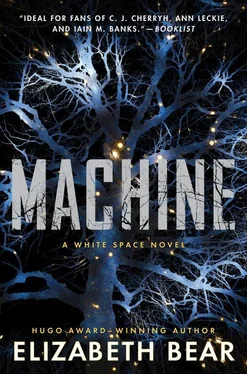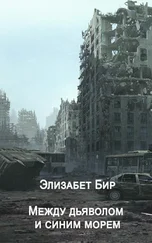I did notice that Helen’s memory gaps seemed to have patterns to them. It reminded me of organic brain damage, except instead of seeming like she had damage to certain aspects of processing speech, or parts of her visual field, the damage asserted itself in recall about a particular crew member’s service record, say, or their love life.
But I kept her talking. This was all fine. Well, not fine. But part of the job. What was a lot harder to deal with was the awkward family dinner that followed. Tsosie and Hhayazh had gone over to Afar while we were out of white space, changing vector, and they needed to rewarm and rest; Camphvis would be heading over to take a turn monitoring our remote patients after we ate. Rhym, who found communal meals incomprehensible, was on rest shift, and we were all sitting around staring at each other while the printer/cooker did its thing.
I wasn’t physically tired, but an entire shift of drawing somebody out of their shell is exhausting. But no matter how much emotional labor I’d done, I wasn’t going to make Tsosie pry his still faintly blue-tinged fingers from his hot chocolate mug. I stood up when the cooker dinged.
“Oh no, Doctor,” Helen said, appearing through the doorway. “Please allow me.”
She bustled to the cooker, interposing herself between me and the device so that I would have had to body check her if I wanted to serve myself, Loese, and Tsosie. She unloaded the cooker and turned, balancing the plates gracefully overhead on fingers grown long and stemlike to support them.
“Doctors,” she said cheerfully, doling the plates out. “Pilot. Would anyone like something to drink?”
Whiskey, I thought, but kept my mouth shut.
Camphvis’s eyestalks twined in amusement. Hhayazh already had its food and was crunching green and orange stalks between its mandibles, an operation I did my best not to observe closely. The busy gnawing hid its own arachnoid amusement.
“Thank you,” I said to Helen. “You should go check on your crew now.”
She made a little curtsey and scuttled back out.
Tsosie gave me a sidelong glance and shook his head sadly, the hint of a smirk deforming his mouth.
“Don’t you even,” I said.
“She likes you, though,” Loese said. Helen had gotten our plates reversed. Loese had my steak, and I had her salad. I like salad, but I grew up on the ground and expect real plants with the texture of real cell walls and water and sucrose inside. Printed plants are horrible. Printed steak is fine.
“Give me my damn food.” I swapped the offending plates and picked up a strip of steak with my chopsticks. The juices, soaking into the polenta underneath, smelled delicious. I stuffed the steak into my mouth. Not as good as vat-cloned, but still spicy and salty and rich enough to take my mind off how irritated I was.
“It wouldn’t be the first time a human has fallen for an AI,” Tsosie said.
I swallowed and drank water. The systers were keeping out of the human banter for once. Thank the Interventionist Bodhisattvas for that one small kindness from the universe.
“They designed her as a sexbot,” I answered, keeping my voice low. “It’s horrible.”
Tsosie, realizing I was really unsettled, raised a hand. “Sorry,” he said. “I know it’s not your fault.”
“Sally,” I asked, “is there anything we can do to tune down the flirtatiousness?”
Sally cleared her throat. “I’m a shipmind, not a psychologist.”
“I’m going to throw this steak in your air vents, computer. Technically, you are a psychologist. Or an AI doc, anyway.”
“I am an AI doc,” she agreed. “And you’re a human doctor. How comfortable would you be trying to rightmind a Neanderthal, even if you had a language in common?”
“Oh,” I said. “I’d be really concerned with breaking them.”
“And if they were already broken?”
“Yeah,” I said. “I see.”
“We’ll be home soon,” Camphvis reassured me with a friendly shoulder pat. I was only wearing a tank top—it can get warm in Sally—and Camphvis’s suckers stuck to my skin, releasing with a gentle pop. Banititlans are very tactile, as a rule. “Oops, sorry about that. And once we’re back at Core General, there are specialists standing by. You don’t have to solve this on your own.”
“What a mess,” said Loese.
I picked up another strip of steak. “You’re telling me.”
IN AN INFINITE UNIVERSE, WHAT’S the single most important thing?
Well, I can tell you. The most important thing in the universe looks like a vast, leafy, lumpy oval, a greenhouse in space. From the outside, it’s the galaxy’s biggest terrarium: a semitransparent jewel embraced by a setting of rare metals, the filigree of jet and platinum threads, catching and softening all the lurid light of the Core’s crowded sky into the warm, precious glow of life.
So much life, crowded into hundreds of levels and dozens of biomes. An engineering challenge for the ages; a triumph of ingenuity and collaboration; a symbol of everything right about the Synarche and a rebuke of all the things we still don’t have figured out.
I’d told Tsosie I didn’t have a relationship with faith, but it occurred to me that that wasn’t entirely true.
I believed in this thing.
It was a good thing, Core General. It was good through and through, top to bottom, coming in and going out. Unreservedly good.
Difficult to navigate sometimes, absolutely. Full of creatures so accomplished in their trade and so confident that they could help that no one would have been able to rightmind away enough of the arrogance to keep it from occasionally permeating the atmosphere and straining the enviro filters, sure. You needed a certain amount of arrogance to slice somebody open and try to fix what’s wrong with them.
And Core General was not immune to mistakes, failures of protocol, and plain glitches.
Not perfect. Nothing is perfect.
But I believed with all my heart that Core General was good . That it meant well.
What did we do here? We saved lives. We alleviated suffering, and I’ve lived with enough suffering to know that any time you can take the edge off it, repair it for even one creature, you are creating a net good in the universe.
Not because the universe cared. The universe was vast and didn’t even care enough to be called implacable. But because life cared, and life had ethics and morals and obligations to one another.
Core General was the concretization of those ethics. It was a place where we ameliorated tragedies, healed victims, comforted survivors. It was a place where we told them not to count the cost in resources, because the Synarche believed that there was no price on a life.
You could never know in advance what a person might become or accomplish, given time. And even if they accomplished nothing, their life was still a life.
It wasn’t our place to judge them. It was our place to save them.
I believed in that so hard it choked me up. And I’d never admit it to Tsosie. But when I opened my eyes to compare the image on the screens to what Sally was feeding into our foxes from her own enormous sensorium, I caught him grinning at me. Just a little.
I shook my head and sighed. He rolled his eyes.
Core General. This vast habitat—the largest constructed biosphere in the galaxy—seemed strangely inevitable against a brilliant and bottomless night. There was no darkness in space here. There was no velvet black between the stars for this small artificial world to rest on as if it were a tumbled aventurine.
There was, in fact, virtually no “between the stars” to speak of. The Core was a gigantic, claustrophobic stellar cocktail party. If there had been any darkness, it would have been lost in the glare of the Saga-star’s accretion disk. The disk alone, though distant, wiped out a swath of the sky. It was so huge and fast-spinning that I could clearly see the redshift sloping along the trailing side. From the slight elevation of my perspective—above its equator—the blueshift along the edge that was rushing toward me glowed bright and true.
Читать дальше












